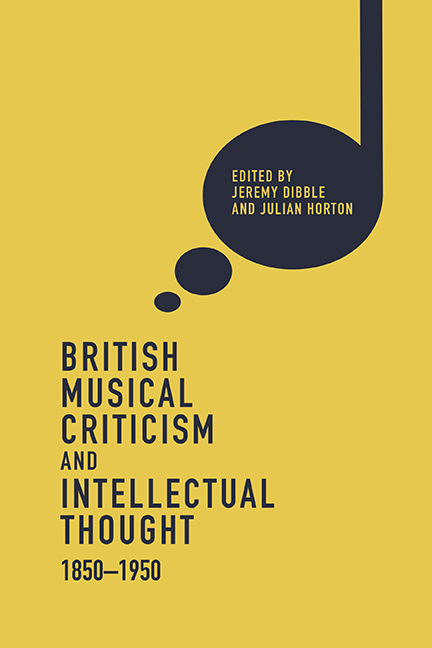Book contents
- Frontmatter
- Dedication
- Contents
- List of Illustrations
- List of Contributors
- Acknowledgements
- Introduction: Trends in British Musical Thought, 1850–1950
- 1 Avoiding ‘Coarse Invective’ and ‘Unseemly Vehemence’: English Music Criticism, 1850–1870
- 2 Spencer, Sympathy and the Oxford School of Music Criticism
- 3 Free Thought and the Musician: Ernest Walker, the ‘English Hanslick’
- 4 Ernest Newman and the Promise of Method in Biography, Criticism and History
- 5 ‘Making Symphony Articulate’: Bernard Shaw's Sense of Music History
- 6 Analysis and Value Judgement: Schumann, Bruckner and Tovey's Essays in Musical Analysis
- 7 The Scholar as Critic: Edward J. Dent
- 8 Russia and Eastern Europe
- 9 Anti-Intellectualism and the Rhetoric of ‘National Character’ in Music: The Vulgarity of Over-Refinement
- 10 Chosen Causes: Writings on Music by Bernard van Dieren, Peter Warlock and Cecil Gray
- 11 ‘Es klang so alt und war doch so neu’: Vaughan Williams, Aesthetics and History
- 12 Constant Lambert: A Critic for Today? A Commentary on Music Ho!
- 13 The Challenge to Goodwill: Herbert Howells, Alban Berg and ‘The Modern Problem’
- 14 Hans Keller: The Making of an ‘Anti-Critic’
- Select Bibliography
- Index
- Titles listed here were originally published
7 - The Scholar as Critic: Edward J. Dent
Published online by Cambridge University Press: 17 July 2019
- Frontmatter
- Dedication
- Contents
- List of Illustrations
- List of Contributors
- Acknowledgements
- Introduction: Trends in British Musical Thought, 1850–1950
- 1 Avoiding ‘Coarse Invective’ and ‘Unseemly Vehemence’: English Music Criticism, 1850–1870
- 2 Spencer, Sympathy and the Oxford School of Music Criticism
- 3 Free Thought and the Musician: Ernest Walker, the ‘English Hanslick’
- 4 Ernest Newman and the Promise of Method in Biography, Criticism and History
- 5 ‘Making Symphony Articulate’: Bernard Shaw's Sense of Music History
- 6 Analysis and Value Judgement: Schumann, Bruckner and Tovey's Essays in Musical Analysis
- 7 The Scholar as Critic: Edward J. Dent
- 8 Russia and Eastern Europe
- 9 Anti-Intellectualism and the Rhetoric of ‘National Character’ in Music: The Vulgarity of Over-Refinement
- 10 Chosen Causes: Writings on Music by Bernard van Dieren, Peter Warlock and Cecil Gray
- 11 ‘Es klang so alt und war doch so neu’: Vaughan Williams, Aesthetics and History
- 12 Constant Lambert: A Critic for Today? A Commentary on Music Ho!
- 13 The Challenge to Goodwill: Herbert Howells, Alban Berg and ‘The Modern Problem’
- 14 Hans Keller: The Making of an ‘Anti-Critic’
- Select Bibliography
- Index
- Titles listed here were originally published
Summary
The ordinary “critics” – of whom (thank goodness) I am no longer one, though I had some experience of that life between 1919 and 1924 – are generally more interested in performers than in composers; my outlook on music is just the other way.
For us in England, who are obliged to earn our living by scribbling about music, it is a very good thing that no one attaches much weight to our opinions.
If Dent's views were not to everyone's taste, they were expressed in a vivid and challenging form that forced his readers to reconsider their basic assumptions. He regarded this as an important objective, and few who have given serious thought to the subject would disagree with him.
Understanding All Music
In 1903 a young Edward Dent (1876–1957) was summoned to the cultural fortress at I Tatti, above Florence, and, fragile tea-cup in his shaking hands, was politely, relentlessly grilled on his ideals by art critic Bernard Berenson. Terrified, but determined not to compromise, Dent found himself stammering that he wanted to ‘understand all music’. ‘Even the bad music?’ his host pressed. ‘But what about Taste?’ Dent stuck to his guns; it was one of the defining moments of his life, first for recognizing the difference between taste and understanding, and second, for taking a deliberate stand against the opinion of a monumental figure like Berenson. The episode remained with him, and at a time when some critics wielded enormous power through diktat, Dent brought another dimension to the critic's role, that of understanding. The scholar, he came to believe, is best placed to explain the mostly opaque processes of composition, whether Mozart's or cutting-edge contemporary; and besides being one of the foremost scholars of his time, Dent was also a gifted writer.
Pinning him down is another matter entirely. Dent applied his scholarship in a number of inimitable, unconventional ways; in his day, few future Professors of Music stage-managed their own production of The Magic Flute or did hack-work for a living. But Dent was a maverick, ‘a highly idiosyncratic character … in many ways a bundle of contradictions’.
- Type
- Chapter
- Information
- British Musical Criticism and Intellectual Thought, 1850–1950 , pp. 154 - 173Publisher: Boydell & BrewerPrint publication year: 2018
- 1
- Cited by



